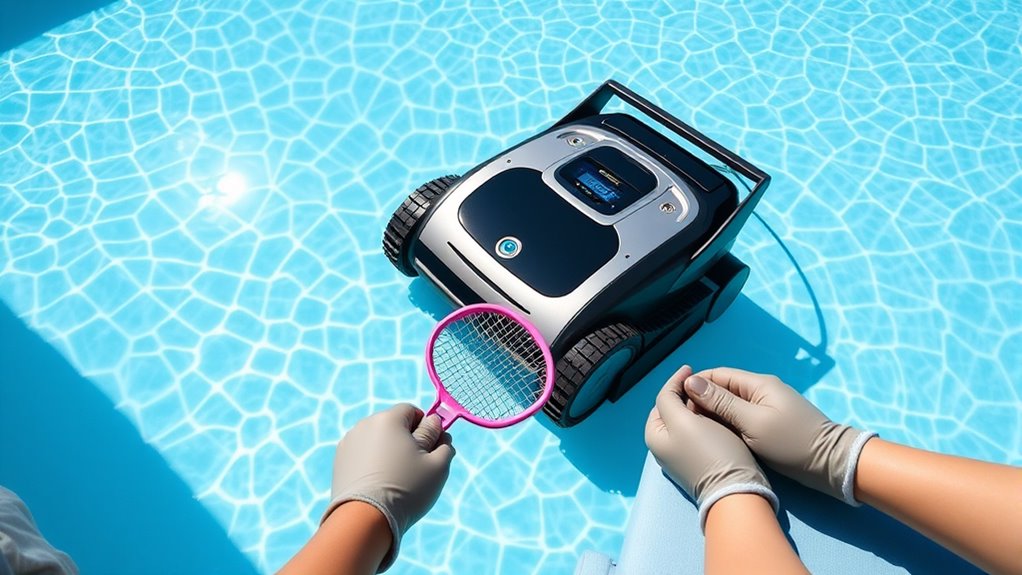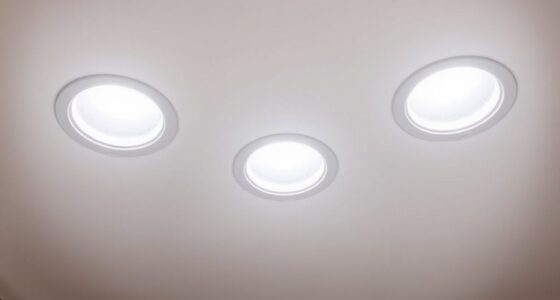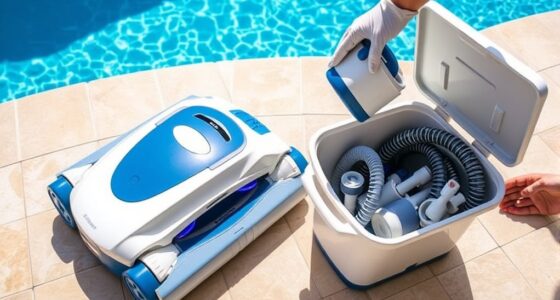Balancing automatic and manual cleaning involves inspecting your pool regularly to identify issues like murky water or debris. Establish a weekly routine that includes testing chemical levels, skimming debris, brushing walls, and running filters. Use automated tools like robotic vacuums and chemical dosing systems to maintain water quality efficiently. Don’t forget seasonal checks and adjustments. Mastering this balance keeps your pool pristine year-round—discover more tips for ideal maintenance ahead.
Key Takeaways
- Regularly monitor water quality and circulation to identify when manual cleaning or chemical adjustments are needed.
- Schedule weekly tasks: test chemicals, skim debris, brush surfaces, and run filters for optimal maintenance.
- Use automated equipment like robotic vacuums and chemical dosing systems to handle routine cleaning efficiently.
- Perform manual spot checks for algae, debris, and water clarity, especially in shaded or hard-to-reach areas.
- Adjust cleaning frequency seasonally, increasing manual efforts during fall/spring and automating tasks in summer.
Assessing Your Pool’s Cleaning Needs
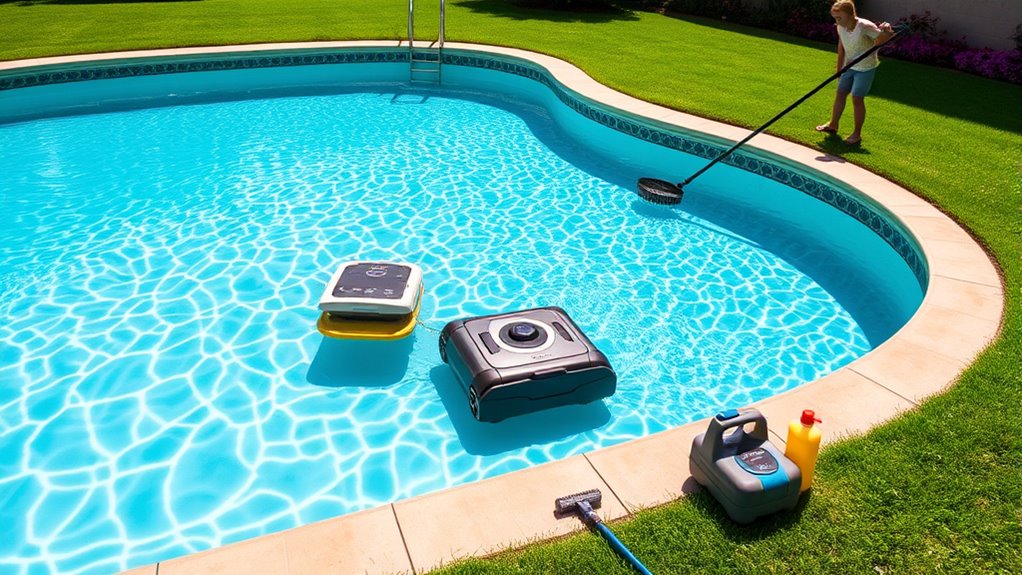
How do you determine how often your pool needs cleaning? The key is monitoring water quality and circulation. Start by checking your pool’s chemical balancing regularly—pH, alkalinity, and chlorine levels—to prevent algae growth and bacteria. If chemicals are consistently off, it indicates your pool needs more attention. Water circulation efficiency also plays a vital role; poor circulation can cause debris buildup and uneven chemical distribution. If the water looks murky or stagnant, it’s a sign your pool isn’t circulating properly, and cleaning is needed. Pay attention to visible debris, cloudy water, or unusual odors. Regularly evaluating these factors helps you decide when manual cleaning or chemical adjustments are necessary to maintain a safe, inviting pool.
Establishing a Weekly Cleaning Routine
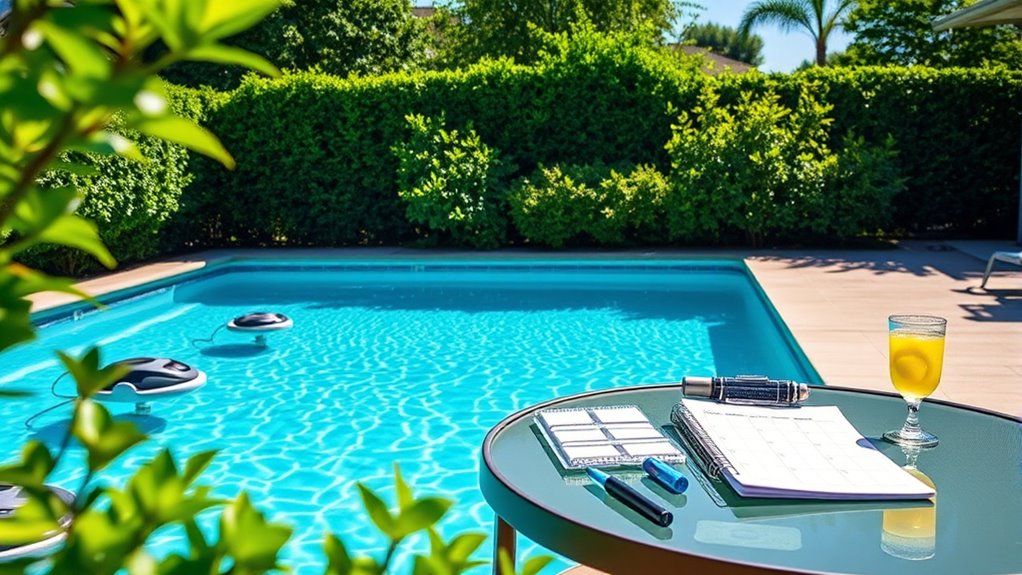
To keep your pool in ideal condition, establishing a consistent weekly cleaning routine is essential. Begin by checking your pool’s chemistry, adjusting pH and chlorine levels to prevent algae growth and bacteria buildup. Regular testing ensures balanced water, which reduces strain on your equipment and keeps the water safe. Next, inspect your pool equipment—skimmers, filters, and pumps—for debris or signs of wear, and perform necessary maintenance. Skim the surface to remove leaves and insects, and brush the walls and floor to prevent algae formation. Running your filter for several hours helps circulate chemicals and remove particles. Staying disciplined with these weekly tasks maintains water clarity, safeguards your equipment, and minimizes longer-term repairs. Consistency is key to a healthy, inviting pool. Incorporating proper equipment maintenance into your routine can further extend the lifespan of your pool components, and integrating preventative strategies can help avoid costly repairs down the line. Additionally, understanding the importance of security measures for your pool area can help protect it from theft or vandalism, especially if you have a large or unattended backyard. Regularly reviewing your tuning and maintenance practices ensures optimal performance and longevity of your entire pool system. Moreover, implementing proper water balance techniques based on water chemistry standards can significantly improve the overall quality and safety of your pool water.
Incorporating Automatic Equipment Effectively
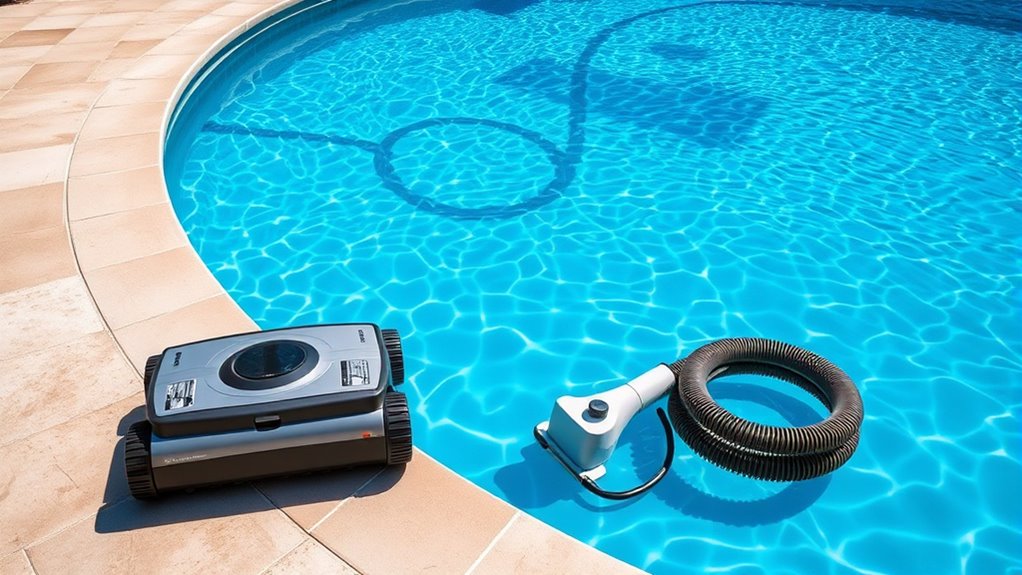
Incorporating automatic equipment into your pool maintenance routine can substantially reduce the time and effort required for regular cleaning. To do this effectively, consider these key steps:
- Program your robotic vacuum to clean during off-peak hours, ensuring consistent debris removal without manual intervention.
- Use automatic chemical dosing systems to maintain proper water balance, reducing the need for manual chemical adjustments.
- Regularly check and clean robotic vacuum filters and sensors to keep them functioning at their best.
- Integrate pool equipment such as automated pumps and sensors to further streamline maintenance and optimize water quality. Incorporating smart technology can also enhance control and monitoring of your pool system.
- Stay informed about automation in business advancements that can be adapted for home pool management to improve efficiency and control. Additionally, choosing energy-efficient HVAC systems for your pool area can help reduce overall energy consumption and operational costs.
Manual Cleaning Techniques for Spot Checks
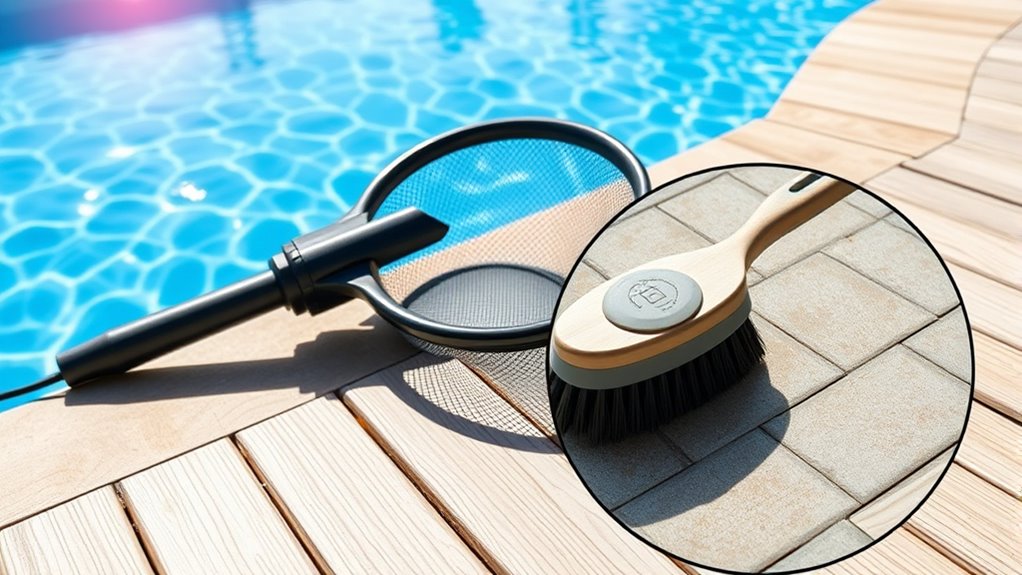
While automatic systems handle much of your pool maintenance, manual spot checks remain essential for ensuring ideal water quality. You should regularly inspect your pool for algae buildup, especially in shaded or hard-to-reach areas. Use a manual skimmer or brush to remove algae from the surface and sides of the pool. During these checks, verify that the chemical levels are balanced—adjust pH, alkalinity, and sanitizer levels as needed. Proper chemical balancing prevents algae growth and keeps your water clear. If you notice cloudiness or discoloration, perform targeted algae removal and recheck chemical levels. Regularly monitoring your water quality and maintaining proper filtration is crucial for top-tier pool care. Incorporating manual cleaning techniques into your routine can also extend the lifespan of your automatic systems and improve overall water clarity. Additionally, inspecting oxidation levels periodically helps ensure your water remains sanitized and free of contaminants.
Seasonal Maintenance and Adjustments
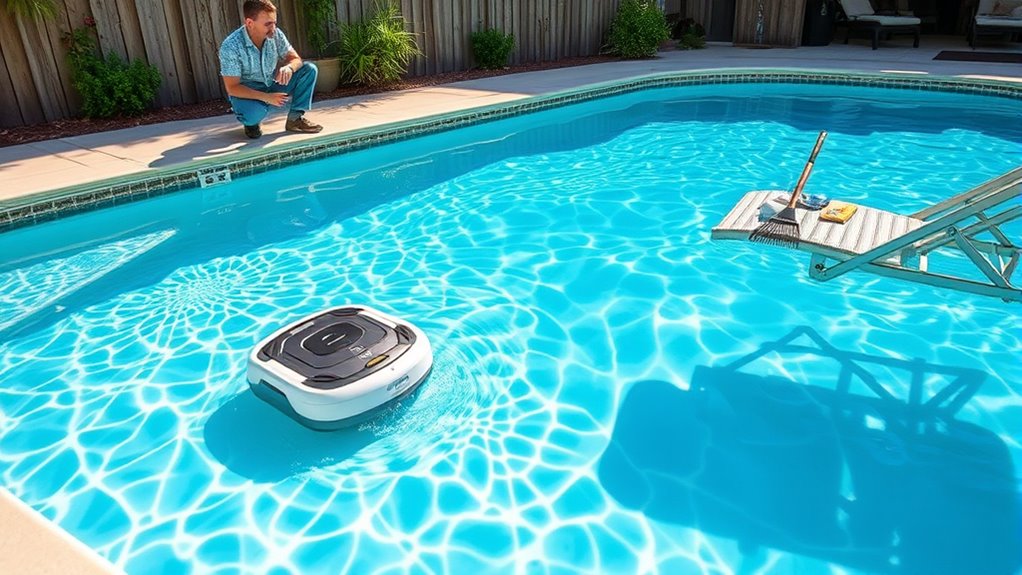
Seasonal changes considerably impact your pool’s maintenance needs, so adjusting your cleaning schedule accordingly is essential. As seasons shift, you’ll need to focus on key tasks like chemical balancing, equipment upgrades, and cleaning frequency. Using outdoor seating options can enhance your experience during summer cleaning sessions. 1. Regularly test and adjust chemical levels to prevent algae growth and maintain water clarity. 2. Prepare your equipment for seasonal shifts by inspecting and upgrading filters or pumps if needed. 3. Increase manual cleaning during fall and spring to remove debris, while automating routine tasks in summer. Additionally, monitoring for debris accumulation and adjusting cleaning frequency ensures your pool stays pristine throughout the year. Incorporating knowledge about Ford Tuning and cleaning schedules can also help you maintain overall wellness during seasonal changes.
Frequently Asked Questions
How Often Should I Replace My Pool’S Automatic Cleaning Equipment?
You should replace your pool’s automatic cleaning equipment when it shows signs of wear, reduced efficiency, or frequent malfunctions. Regularly check that your equipment helps maintain proper pool chemical balance and prevents algae buildup. Typically, automatic cleaners last about 3-5 years, but if it’s not performing well despite maintenance, replacing it sooner guarantees effective algae prevention and keeps your pool sparkling clean.
What Are Signs My Manual Cleaning Tools Need Upgrading?
If your manual cleaning tools aren’t effectively removing algae or debris, it’s time to upgrade. Signs include struggling to maintain proper pool chemical balance, especially with algae growth indicators like green water or fuzzy surfaces. Worn-out bristles, broken handles, or damaged skimmers also signal it’s time for new tools. Upgrading ensures thorough cleaning, helps keep your pool crystal clear, and reduces the effort needed to maintain ideal chemical levels.
Can Automatic Cleaners Damage Delicate Pool Liners?
Think of your pool liner as a delicate canvas. Automatic cleaners, if not properly maintained, can cause pool liner damage, similar to a rough brush damaging fine fabric. Regular automatic cleaner maintenance prevents this. While most modern cleaners are gentle, using them on rough surfaces or neglecting maintenance can lead to damage. Always check manufacturer guidelines and inspect your pool liner regularly to keep it pristine and damage-free.
How Do Weather Changes Affect My Cleaning Schedule?
Weather impact can considerably influence your cleaning schedule, so you should make seasonal adjustments accordingly. During heavy rain or storms, debris accumulates faster, requiring more frequent manual or automatic cleaning. Hot, dry weather can cause dust and pollen to settle, also needing attention. By monitoring weather patterns, you can adapt your routine, ensuring your pool stays clean and inviting while avoiding unnecessary cleaning efforts when conditions are mild.
What Are the Best Times of Day for Manual Cleaning?
You should schedule manual cleaning during the early morning or late evening, as these times often have calmer weather and less debris falling into your pool. Consider your daily routines and choose timings that fit seamlessly, avoiding midday when the sun’s strongest and debris may be more active. Timing considerations help you stay consistent, making your pool maintenance more effective and manageable without disrupting your day.
Conclusion
So, there you have it — a foolproof plan to keep your pool sparkling without losing your mind. Just remember, no system is perfect; even the best automatic cleaners need a little human love now and then. Embrace the dance of manual checks and high-tech gadgets, and you’ll be swimming in crystal-clear water all season long. After all, who needs a spa day when your pool’s consistently pristine? Happy cleaning!
